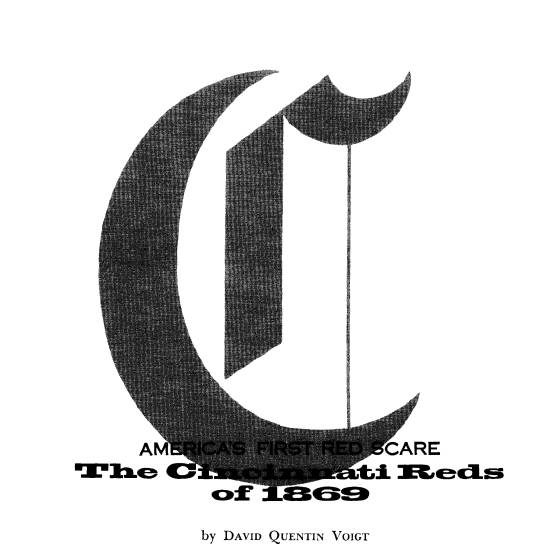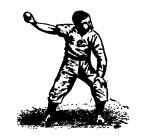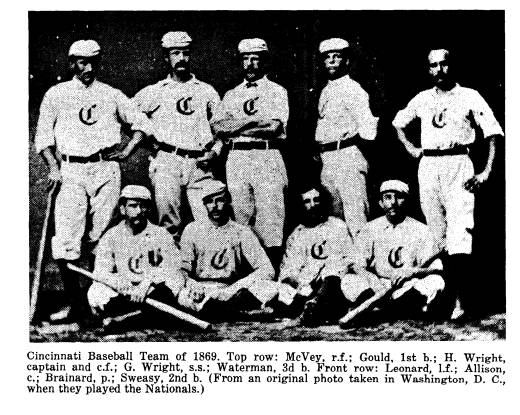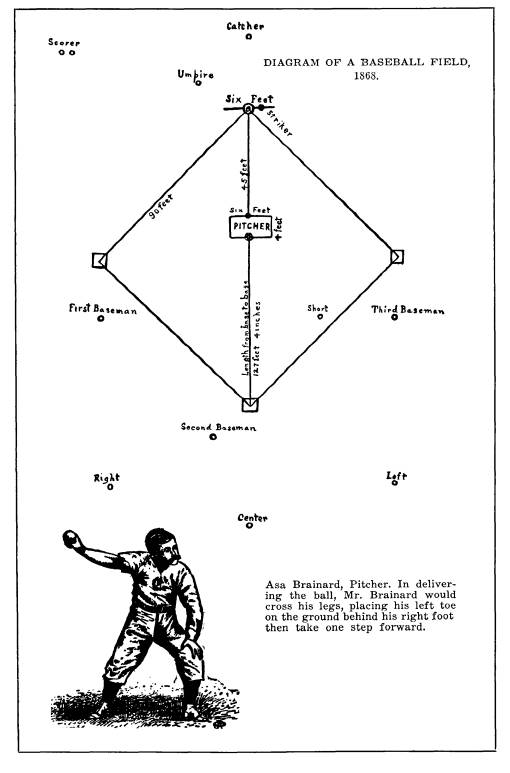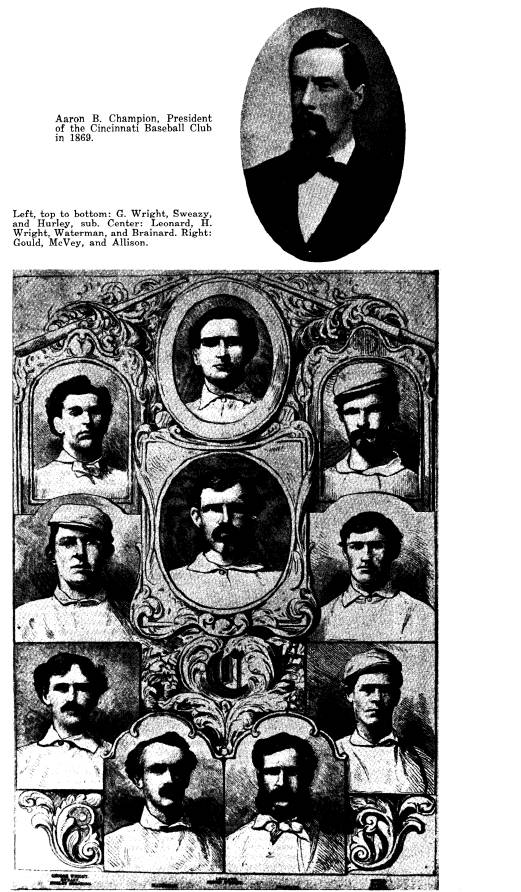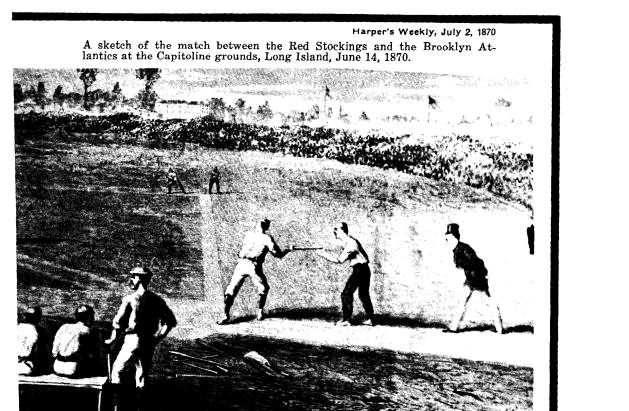Ohio History Journal
- 1
- 2
- 3
- 4
- 5
- 6
- 7
- 8
- 9
- 10
- 11
- 12
|
?? The ?? Reds of 1869 by DAVID QUENTIN VOIGT We are a band of baseball players From Cincinnati City; We come to toss the ball around And sing to you our ditty; And if you listen to the song We are about to sing, We'll tell you all about baseball And make the welkin ring. The ladies want to know Who are those gallant men in Stockings red, they'd like to know. When the victorious 1869 Red Stockings were on tour, they introduced themselves by singing the team's official song, set to the tune of "Bonnie Blue Flag." Each verse lauded a different player. NOTES ON PAGE 68 |
|
14 OHIO HISTORY |
|
|
|
If the image of major league baseball today is somewhat eclipsed by the growing popularity of rival sports, at least America's "national game" has earned the respect due to old age. For this year the clock ticks off the one- hundredth year since the first professional team supposedly took the field. As the story goes (and given half a chance any old time aficionado can re- late it), it was the Cincinnati Red Stockings of 1869 who fielded the first professional team and who, by ruthless determination won eighty-one straight victories, demonstrated the efficiency of the new mercenary method of player recruitment.1 From that point on it was but a step to the birth of the major leagues and to a long period of their stability which is only now being rudely shattered by franchise changes and plans to restructure the major leagues into four divisions. Like most baseball myths the truth is strained in the telling and often there is a manufactured quality about them. For example, baseball's birth is wrapped up in a myth packaged by an official commission which met at the turn of this century to inquire into the game's origins. In most uncriti- cal fashion the commission took the dubious word of one of its aged mem- bers who claimed that his boyhood chum and lifelong hero, the late Civil War General Abner Doubleday, had "invented" the game one afternoon in 1839. A similar type myth of "immaculate conception" is used to ex- plain the sudden appearance of professional baseball in Cincinnati in 1869.2 To begin, there is the claim that the 1869 Cincinnati Reds were the first professional players, an interpretation that hinges on the meaning of the word "professional." When applied to players, it usually refers to one's ability to earn a living playing the game. Using this yardstick, the 1869 Reds were far from first. In the early 1860's Al Reach, star infielder for the Philadelphia Athletics, was paid a straight salary for his talents, and most prominent teams of his day had at least two salaried stars on hand to back up their amateurs.3 Moreover, Harry Wright, the "father of profes- sional baseball" and later player-manager of the 1869 Cincinnati Reds, wrote in his diary of 1866 that the Athletics were also paying $20 a week to three others. And in 1868 with nonchalant acceptance, sportswriter Henry Chadwick listed the names of ten professionals on the Brooklyn Eckfords.4 Furthermore, in that era the straight salary route was not the only ave- nue to baseball professionalism. In addition, the National Association labeled players "professionals" if they worked for "place or emolument."5 |
|
CINCINNATI REDS 15 Thus, quite a few players of the 1860's qualified under a system which of- fered lusty lads "honorary" jobs that called for good pay for almost no work. In the case of the New York Mutuals such jobs were to be found in the Coroner's office; and, in Washington, the Treasury Department was reputed to be "the real birthplace of professional baseball." Elsewhere, in similar fashion, local civic leaders did their part so that their home teams could compete in an age of bitter inter-city rivalry.6 Still another road to professionalism was the time honored custom of passing the hat at important games and dividing receipts among stars. A common practice in Washington, Philadelphia, and Brooklyn, stars often got as much as $200 for a day's work. And a popular variation of the theme was the benefit game held to honor stars; in 1863 Wright pocketed $29.65 in this manner, some of the money coming from the sale of souvenir tickets with "a picture of a Professional on each."7 Not surprisingly, such payoffs evoked criticism from amateur elements who charged that gamblers were contributing to the professionalization process by bribing players to throw games. By 1869 the ugly word "hippo- droming" was widely used to describe games suspected of having been rigged in advance by gamblers. In 1870 the New York Mutuals became the center of controversy when it was revealed that one of their stockholders, William Marcy ("Boss") Tweed, had contributed $7500 to the team. As |
CINCINNATI REDS
17
one outraged amateur protested at the
meeting of the National Association,
Tweed "probably got his money back
again."8
With "professional" baseball
an entrenched reality by 1868, skilled play-
ers found themselves in an enviable
bargaining position with clubowners
because they could threaten to go
elsewhere. In blasting such "revolvers"
for jumping "without so much as a
by your leave," Chadwick demanded
restrictions, pleading: "Since
professional baseball is a business," it must
be pursued "honestly and openly and
above board."9
Partly in response to such demands, and
mostly in the interest of team
stability and profits, Harry Wright as
player-manager of the Reds elected
to sign all his 1869 Reds to full season
contracts and to challenge even
the best eastern teams. But this was not
a sudden decision, and the bearded
Wright who had spent most of his life
playing, managing and studying
field sports, first as a cricketer and
then as a baseball player, knew what
he was doing. The sons of a noted
cricket professional, Wright and his
brother George, were already ranked among
the best ballplayers in Ameri-
ca. Moreover, Wright knew where the best
men were and was confident
of his ability to obtain them.10
The most unusual aspect of Wright's
dream of team professionalism was
that this would be the first time a
western club dared such a thing. In the
recent past other clubs had taken the
grand tour, but they had been estab-
lished eastern teams, like the
Washington Nationals or Brooklyn Eckfords.
That a lowly western team might gain
prestige from such a venture helped
to sell Wright's plan to local backers.
Certainly the city of Cincinnati was
growing and some leading citizens were
anxious for a national identity that
would transcend the somewhat snide
epithet of "Porkopolis."
Among the leading boosters of Wright's
plan was a twenty-six year old
lawyer, Aaron B. Champion, who was the
organizer and newly installed
president of the Red Stockings. Anxious
to promote the commercial growth
of Cincinnati, Champion viewed baseball
as a vehicle for advertising the
city and its products. In pursuit of
this plan in 1868 he talked his directors
into spending $11,000 to beautify the
ball field and to equip the players.
By standards of the day this was big
money, but late in the year Champion
brashly promoted another $15,000 through
the sale of new stock for the
express purpose of buying the best
ballplayers in America. To insure top
quality flesh for his money, Champion
sought to lure the nine New York
Clipper medal winners of 1868 to Cincinnati. In its modern
application,
such a plan would mean a novice baseball
promoter was trying to buy up
the members of the major league all-star
team. To be charitable, such an
idea, even in 1868, was unsophisticated.
In those days players were un-
fettered by reserve clauses that tie
today's men to single clubs, and thus
were free to go anywhere. But, in fact,
most stars had strong personal at-
tachments to their clubs, and the
prospect of relocating in a town like
Cincinnati was not overly enticing.11
Nevertheless, then as now, stars liked
to get more money and the Cin-
cinnati offer provided a nice wedge for
prying more money from their own
clubs. Thus, it was not long before an
unscrupulous pair pulled this trick;
18 OHIO HISTORY
they first accepted the Cincinnati
offer, and then rejected it after more
money was forthcoming from their parent
clubs. Naturally this treachery
upset Champion who had publicized their
acceptances and was obliged to
eat crow. After much blustering and
fruitless legal maneuvering, Champion
made his wisest decision. He entrusted
the scouting to Manager Wright.
Certainly few men of the time knew more about
the baseball talent
market than Wright, who had the
reputation of being "unapproachable
in his good generalship and
management."12 Then, as later, Wright was
guided by his belief that fans would pay
to see well trained and well be-
haved players perform. Already he had
tested the principle to his satisfac-
tion, for in a single season he had
transformed the newly established Red
Stocking club into the pride of
Cincinnati. In a few weeks after receiving
his new assignment, Wright completed the
job of recruiting his 1869 dream
team. As Wright saw it, only a few
changes were necessary since the 1868
team already had six men good enough for
the task. Besides himself, he
retained catcher Douglas Allison, first
baseman Charles Gould, dubbed
"the bushel basket" for his
sure hands, third baseman Fred Waterman, out-
fielder Calvin McVey, and the bearded
pitching ace, Asa Brainard. In
rounding out the team Wright snared
outfielder Andy Leonard, second
baseman Charles Sweasy, and utility man
Dick Hurley from the ranks of a
hometown rival, the Buckeyes. Then for
insurance Wright raided the Mor-
risania (N.Y.) Unions, picking up his
brother George a Clipper medalist,
for shortstop, and Dave Birdsall for
outfield duty. Thus, in efficient fashion
Wright marshalled the elite team that he
proposed to lead on a nationwide
tour, and accepted challenges from any
host team that promised the Reds
as much as a third of the daily gate
receipts.13
Normally the club existed on receipts,
and the biggest capital expense
was salaries. Contracts ran from March
to November, and some records
show George Wright drawing top pay at
$1400. Next came Harry at $1200;
Brainard $1100; Waterman $1000; Sweasy,
Gould, Allison, Leonard and
McVey, $800 apiece; and Hurley $600. And
even if George Wright's later
claim is correct, that Harry, instead,
received $2000 and he $1800, the fact
remains that the first all-salaried team
was a modest investment.14
Nevertheless investors thought the sum
was awesome and their fears
forced Wright to think in terms of big
gate receipts toward which he di-
rected his spartan training regimen. A
tireless drillmaster and clever
teacher of tactics, he welded the
players into an efficient machine and won
high praise from Chadwick who said that
only when other managers fol-
low his lead, "may they expect a
similar degree of success."15
Along with his emphasis on training,
Wright demonstrated a flair for
shrewd showmanship in his choice of team
uniforms. In sending instruc-
tions to the club tailor, Mrs. Bertha
Bertram, bright red stockings were
ordered to complement the white flannel
shirts and pants and the spiked
Oxford shoes. A happy choice, it gave
the team a colorful appearance that
delighted local fans. Like the club's
proud record of victories, its colorful
hose became its totem; and long after
Wright disbanded this team, other
Cincinnati teams adopted the red
stockings as a trademark. Indeed, Cin-
20 OHIO HISTORY
cinnati's current major league entry
carries on the tradition, although the
nickname is now the Redlegs.16 Meanwhile
in their own day the first Red
Stockings stirred national comment for
garishness, and in 1871 Chadwick
credited the team for setting a new
style trend for their "comfortably cool,
tasteful" dress, "the color of
the stockings giving the hue to the entire
suit."17
Like Wright, the publicity-seeking
Champion found his niche as a club
mythmaker. It was he who arranged for a
full-time reporter from the Cin-
cinnati Commercial to keep fans
well supplied with fodder on the team's
movements. Already in 1869 baseball was
a two-dimensional spectacle, one
being the world of the playing field and
the other of newspaper columns
on the game. In 1869 the job of
publicizing the Reds as the first pro team
fell to Harry M. Millar, and he always
licked the hand that fed him. His
flood of copy, punctuated with
admiration for Wright and high praise for
the stars, built the legend of the Reds
as a spartan superteam, a credit to
the ethic of hard work.
It was Millar who accurately forecast
the long winning streak when he
described the team as "so well
regulated that it should avail itself of its
capabilities of defeating every club
with which it contests." Millar's fore-
cast came on the eve of the club's
departure for the East, where its reputa-
tion would be tested by the best teams in
the land. Until then the Reds
had fattened on weaker rivals and local
"picked nines" in fashioning a
string of seven straight wins. Moving
east the team added ten more vic-
tories before invading metropolitan New
York for its moment of truth.
It was mid-June when Wright's team came
to town and Champion's pro-
motional campaign was in high gear,
stressing the novelty of the audacious
western Cinderella team daring to
confront eastern titans in their home
yards. The test came on June 14 when,
before a partisan crowd of 8000 at
Brooklyn's Union Grounds, the Reds
downed the powerful Mutuals, 4-2.
It was the victory Champion had counted
on, and when his announcement
hit Cincinnati, joy reigned and streets
filled with cheering fans. "Go on
with your noble work," rang a
congratulatory telegram. "Our expectations
have been met."18
Unruffled by the lavish praise, Wright's
team continued to defeat eastern
powers and to attract ever larger
crowds. In Washington the players met
President Grant, "who treated them
cordially and complimented them on
their play." Later at the game a
writer commented that the Reds "drew
the most aristocratic assemblage . . .
that ever put in an appearance at a
baseball match."19
As the team rode the crest of its
victory wave, more sophisticated journals
took note. Harper's Weekly published
half a page of drawings of the
"picked nine" and included a
team picture showing grim, young faces
fortified by beards and sideburns. But
such praise was merely a warm-up
for the homecoming reception that
awaited in Cincinnati. Returning home
late in June, the Reds found a joyous
welcome and were drowned in local
pride that today would certainly be cited
for its unsophisticated hero-wor-
ship. At last the Commercial tried
to dampen its excesses, complaining that
CINCINNATI REDS
21
some rabid fans hardly understood the
game, citing one aged enthusiast
who admitted that he knew little
"about baseball, or town ball, now-a-days,
but it does me good to see those
fellows. They've done something to add
to the glory of our city." And a
companion put a finger on the cause of
such joy--"Glory, they've
advertised the city--advertised us, sir, and helped
our business, sir."
The glow lingered for weeks, but the big
moment had come the first day
when Champion accepted the gift of a
twenty-seven foot bat from a local
lumber company on which were painted the
names of all the heroes. All
day long Champion and the team had gone
from one fete to another, with
the climax coming at a gala ball that
lasted until early morning. There,
as he relaxed under the "Welcome
Red Stockings" streamer, the giddy
Champion allowed that at the moment
being president of the Reds was
the highest office in the country.20
After this celebration came a long
homestand with the Reds maintaining
their winning pace, although once they
were tied by the "Haymakers" of
Troy, New York. The official account of
this blotch on the team's spotless
escutcheon is a hurried blur, with Troy
being blamed for unsportsmanlike
conduct. As the tale goes, it was the
fifth inning with the score tied at 17-
all when the Troy captain quarreled with
the umpire. In a moment the
fray grew hot and the captain, joined by
the Troy president, cursed the
umpire and ordered the Haymakers off the
field. The effect was to turn
the crowd into a riotous mood, and a
brawl was averted when the umpire
forfeited the game to the Reds. At the
time the Commercial blamed it on
the New York gamblers, including
Congressman John Morrissey, the king-
pin of the lot. As the Commercial explained,
Morrissey stood to lose $17,000
if the Reds won, so it was he who
ordered the phoney sit-down. But others
thought differently, and later the
judiciary committee of the National As-
sociation ruled the contest a tie,
disallowing the forfeit.21
Otherwise, the Reds continued their
winning ways and staged a trium-
phant march through the West, enabling
them to close the 1869 season
with fifty-seven victories, a tie and no
defeats. In reading the official ac-
count, one is left with the firm opinion
that the feat was entirely due to
clean living, hard work, and shrewd
capitalism.
But if the achievement was Olympian, the
men who did it were patently
human. To read Harry Wright's diary
account is to share the mixed joys
and understand his problems in managing
this team of "supermen." Often
the team drew well, like the time 15,000
saw them play in Philadelphia,
or the 23,217 total for six games in New
York which returned $4,474 in
receipts. On the other hand there were
days when the club might better
have stayed home. In Mansfield, Ohio,
the club collected a mere $50, and
in Cleveland, $81. And when the team
arrived for a game in Syracuse,
New York, Wright was horrified to find a
live pigeon shoot taking place
at the ball field, where the outfield
grass was a foot high and the fence in
shambles. Upon inquiring, Wright learned
that nobody remembered sched-
uling the game, so the Reds and their
manager settled for the therapeutical
consolation of a salt bath at a local
spa for a cost of thirty-five cents.
|
22 OHIO HISTORY Hard after this disappointment came another in Rochester. Arriving there Wright found the park in good shape with an eager crowd on hand. But when the game was barely underway, a freak cloudburst soaked the field. Wright was equal to the challenge; determined to save the receipts, he and his men "got some brooms, swept the water off, and put sawdust in the muddy places and commenced playing again." Wright's diary also dispells the Sunday school decorum of the team. Al- though well-trained and disciplined, his boyish players were unruly. Often they straggled, missed trains, and ducked practices. The worst offender was pitcher Brainard, but even brother George cut practices. Brainard's odd personality led him into a variety of troubles. This was tough on Wright, for the pitcher was a key man and the style of the time called for one pitcher to work nearly every game. This demand was less rigorous than it sounds since the pitching distance at the time was only forty-five feet and pitchers threw underhanded. But it was Wright's lot to be saddled with a good pitcher whose hypochondria always included some vague ailment. Brainard needed cajoling constantly, and when the best arguments failed, Wright pitched himself, using a baffling "dewdrop" to hold down the enemy while his mates slugged harder than usual. If Brainard's miseries were not enough, he was also a night owl. Once when the exhausted team detrained in Buffalo at 4 A.M., everybody will- ingly took to bed except the pitcher and his pal, Fred Waterman, who chose to roam the streets looking for action. Yet withal Wright knew that Brainard was one of the best hurlers in the country, a man who battled like a demon in tough contests but sometimes loafed when the going was easy. Because of his negligence, Wright often threatened him with fines. On top of all this, Brainard was also a character; in George Wright's words, he got "odd notions." Once during a game a wild rabbit scampered across |
|
CINCINNATI REDS 23 the diamond passing in front of the pitcher, who forgot batter and runners and threw the ball at the bunny. The impulsive act cost the Reds two runs while the rabbit escaped unscathed.22 Nor did Wright's troubles end with personality problems. A constant vigilance was necessary to keep the uproarious team off bottled spirits. Al- though Wright was a temperance man, he was wise enough to know that he lived in an age when the ability to hold hard liquor was a measure of masculinity. That Wright fought a losing battle against John Barleycorn was apparent, for in 1870 the Commercial announced that the personal contracts of the Red Stockings terminated November 15, and "No player will be accepted next year who will not contract to abstain from intoxi- cating beverages at all times, unless prescribed by a physician in good standing."23 With enough internal problems to vex a missionary, Wright also faced the external problem of growing envy among opposing teams. As victories mounted, the Reds became the target of mounting jealousy. Partisan news- men whipped up emotion, and after the Reds' march through New York, Gotham papers sneered at the team's brand of professionalism. One editor argued that any player who works for pay ought to be "disgraced," or fired if he holds a commercial job since all are easily bribed. It was argued that all players were at "the beck and call of the sporting men, who bring them into the ring, game-cock fashion, and pit them against each other for money."24 Meanwhile other detractors disparaged the "eclectic" character of the Reds. This implied that a respectable team ought to use only home grown players, a ridiculous charge that not only failed to consider the mobility of most Americans, but also the "eclectic" character of Wright's rivals. Yet Wright was powerless to fend off the attacks, and he consoled himself with |
24 OHIO HISTORY
the hope that it would take at least a
year for rivals to catch up with his
team in organization and training.
But Wright was wrong. After winning the
first twenty-seven games in
the 1870 campaign, his team faced
another moment of truth on June 14.
In Brooklyn, a likely place for the rise
and fall of baseball dynasties, the
avenging team was the Brooklyn
Atlantics. Playing at the Capitoline
Grounds, the Reds suffered their first
defeat since late 1868 (after winning
81, 84, 87, or 92 straight, depending on
how one counts informal games),
by a score of 8-7. With the game tied
5-5 in regulation time, Wright might
have settled for a draw, but with
Champion's approval he chose to gamble
on an extra inning victory. At the end
of the tenth, the score was still tied.
The Reds took the lead in the top of the
eleventh, but Brooklyn pushed
winning runs across in their half, aided
by errors by second baseman Sweasy.
Lacking none of the sportsmanlike spirit
of future Brooklyn crowds, this
one went for the Reds with a vengeance.
One over-eager fan jumped on
the back of outfielder McVey as he
attempted to field a ball, thus assisting
one of the Brooklyn runners in scoring
in the eleventh. And after the
victory a mob of fans made the team run
a gauntlet of jeers and catcalls
before the Reds made it to their
carriage. With the team riding in an open
carriage, the ordeal lasted all the way
to the hotel where Champion in the
safety of his room broke down and wept.
Later he wired the Commercial:
"Atlantics 8, Cincinnatis 7. The
finest game ever played. Our boys did
nobly, but fortune was against us.
Eleven innings played. Though defeated,
not disgraced."25
The wide publicity given this defeat
testified to the rising tide of public
enthusiasm for big-time baseball. For
this the Reds can take only part
credit for the boom was afoot before
1868 and continued after the Reds
slipped from the top. Indeed, it is
remarkable how quickly fans abroad and
at home lost interest in the Reds after
they lost. This was a lesson later
owners would learn well, but it seemed
harshly brutal to Champion. Be-
cause of falling attendance and another
loss at the hands of Chicago, he
faced a stockholder revolt that cost him
his presidency. With a new regime
committed to austerity, even though the
books balanced, Cincinnati was
no place for big-time baseball and the
Wrights knew it. Hard after Cham-
pion's defeat, the Wrights announced
their decision to move to Boston
where more money awaited both, and where
Wright would build the
Boston Red Stockings into the perennial
champions of the first major
league.
With the Wrights' departure, Cincinnati
baseball reverted to modest
amateur proportions,26 although
the city later regained major-league status
and ever after traded on its reputation
as the birthplace of professional
baseball. And certainly the Reds were
the catalyst which speeded the process
of baseball's commercial growth.
THE AUTHOR: David Quentin Voigt
is a professor in the Sociology
Department,
Albright College, Reading,
Pennsylvania.
|
?? The ?? Reds of 1869 by DAVID QUENTIN VOIGT We are a band of baseball players From Cincinnati City; We come to toss the ball around And sing to you our ditty; And if you listen to the song We are about to sing, We'll tell you all about baseball And make the welkin ring. The ladies want to know Who are those gallant men in Stockings red, they'd like to know. When the victorious 1869 Red Stockings were on tour, they introduced themselves by singing the team's official song, set to the tune of "Bonnie Blue Flag." Each verse lauded a different player. NOTES ON PAGE 68 |
(614) 297-2300
